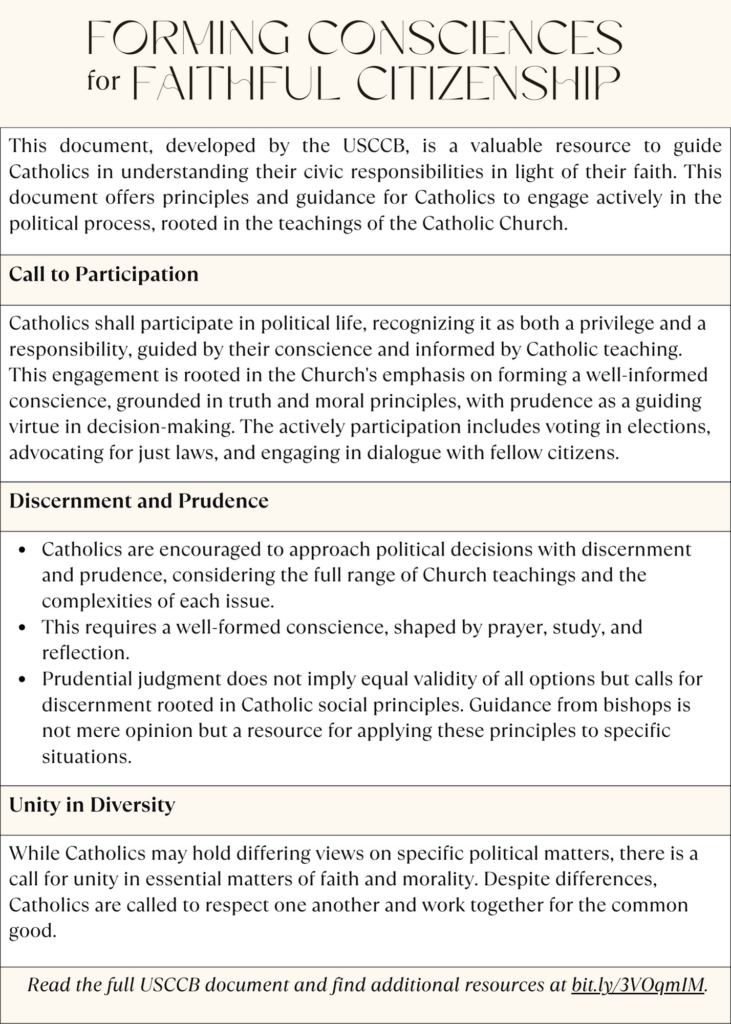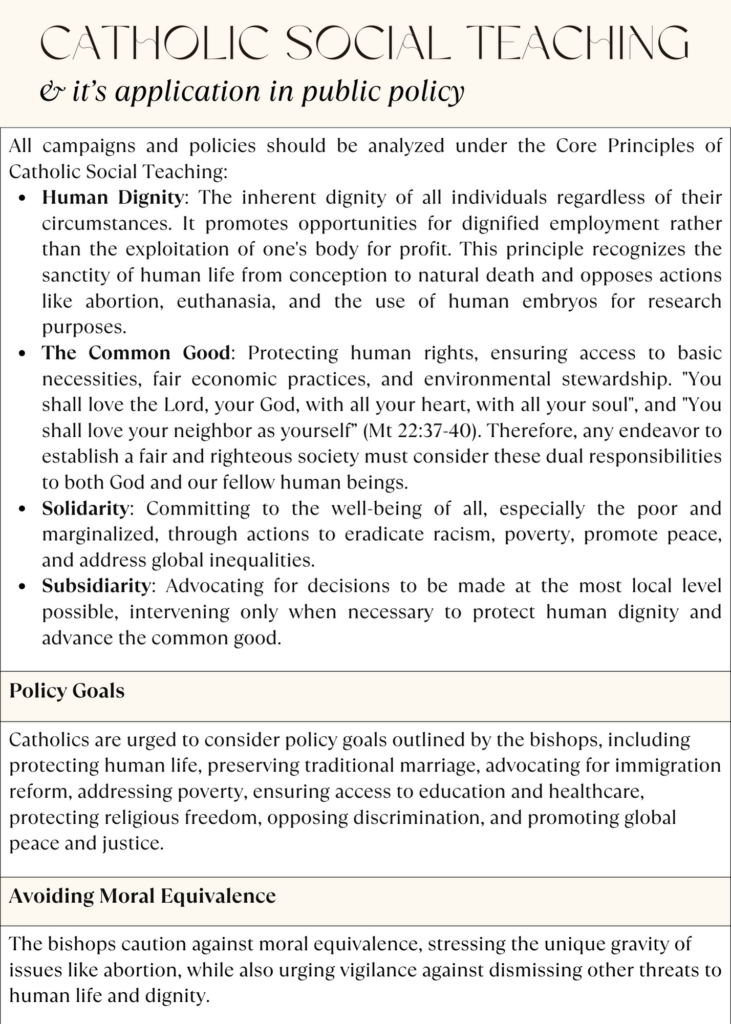Public Policy
On the 75th anniversary of the United Nations Universal Declaration of Human Rights, the Dicastery for the Doctrine of the Faith reaffirmed the Declarations importance as a guiding framework for human rights. Despite progress, they noted ongoing challenges and expressed solidarity with human rights defenders. The Church presents the Declaration “Dignitas Infinita” on Human Dignity, fervently advocating for the respect of human dignity as the cornerstone of the common good and the foundation of just legal systems. It asserts that upholding human dignity is essential for any society claiming to be grounded in justice, transcending mere displays of power. Furthermore, the Church emphasizes the collective responsibility of individuals and communities to ensure the realization of human dignity, while also stressing the role of states in protecting and fostering the conditions necessary for its flourishing.
In this spirit, the Declaration identifies and addresses various categories of violation of human dignity prevalent in contemporary society. These include extreme poverty, war, the plight of migrants, human trafficking, sexual abuse, violence against women, abortion, surrogacy, euthanasia, assisted suicide, the marginalization of people with disabilities, gender theory, sex change, and digital violence. Each of these categories represents a distinct affront to human dignity, manifesting in different forms of exploitation, discrimination, and disregard for the intrinsic worth of individuals. Despite the challenges posed by these violations, the Church remains resolute in its commitment to promoting the dignity of every person, drawing hope from the transformative power of the Risen Christ, who fully revealed the integral dignity of all humanity. Pope Francis’s poignant plea resonates as a universal call to safeguard the inherent dignity that belongs to each individual: “I appeal to everyone throughout the world not to forget this dignity which is ours. No one has the right to take it from us.”
Some categories of violation of human dignity prevalent in contemporary society:
- The Drama of Poverty. Extreme Poverty linked to unequal distribution of health is a factor that denies the dignity of so many human beings. Pope Francis argues that new forms of poverty have emerged. Despite increased wealth, inequality persists, giving rise to new forms of poverty. Traditional measures of poverty are inadequate for present realities. Poverty can take different forms such as the detrimental effects of prioritizing profit over labor, leading to unemployment and deepening poverty. The loss of work and dignity is the ultimate poverty. Furthermore, inequality, whether by birth or circumstance, violates human dignity, implicating all in addressing this injustice.
- War. “War is always a defeat of humanity”. Pope Francis emphasizes the futility of war as a solution, suggesting that the risks outweigh any perceived benefits, advocating for a departure from the concept of a ‘just war,’ and highlighting the contradiction of waging war in the name of religious convictions, which ultimately undermines religion itself.
- The Travail of Migrants. Migrants face profound challenges, often being denied dignity in their home countries and risking their lives to seek better opportunities elsewhere, only to encounter exclusion and dehumanization in host countries, highlighting the urgency to recognize their fundamental rights and uphold their intrinsic dignity regardless of origin, race, or religion.
- Human Trafficking. Human trafficking, branded as a vile activity and a disgrace to civilized societies by Pope Francis, underscores a broader spectrum of violations against human dignity, including the marketing of organs, sexual exploitation, slave labor, terrorism, and organized crime, prompting an urgent call for effective institutional measures to combat these scourges and reaffirm the centrality of human dignity, which is profoundly undermined by both the victimization and perpetration of such crimes. Exploiters and clients should deeply reflect on their actions both personally and in the context of their spiritual beliefs.
- Sexual Abuse. Sexual abuse inflicts enduring wounds on the dignity of individuals, leaving lasting scars that cannot be healed by mere repentance, affecting both society and the Church. Thus, the Church is committed to tirelessly combating all forms of abuse, beginning with addressing issues within its own ranks.
- Violence Against Women. Violence against women is increasingly recognized as a global scandal, with deep-rooted inequalities persisting despite nominal acknowledgments of equal dignity and rights. Pope Francis and Pope St. John Paul II have both emphasized the urgent need for societal and legal changes to address these injustices, condemning not only physical violence but also systemic discrimination and exploitation. Specific forms of violence such as coercive abortions and polygamy are highlighted as egregious violations of human dignity, with femicide standing out as a particularly grave concern requiring concerted international action.
- Abortion. The Church emphasizes the intrinsic dignity of every human being from conception to natural death, condemning abortion as a grave violation of this dignity. Pope St. John Paul II articulates the seriousness of abortion, warning against euphemisms that obscure its true nature and stressing that the defense of unborn life is integral to upholding all human rights. This stance underscores the sacredness of human life and the need for unwavering conviction in its protection, both from a rational and a faith-based perspective. Today we face societal acceptance of abortion as indicative of a moral crisis, wherein the fundamental right to life is disregarded, and distinctions between good and evil are blurred. The Declaration encourages us to confront the reality of abortion without euphemisms or self-deception, citing the danger of moral relativism. It also emphasizes the gravity of abortion as the deliberate killing of a human being, rejecting ambiguous terminology that seeks to soften its impact. It asserts the intrinsic dignity of unborn children as the most vulnerable members of society, whose protection is essential for upholding all human rights.
- Surrogacy. The Church staunchly opposes surrogacy, condemning it as a grave violation of human dignity. Pope Francis condemns surrogate motherhood as exploitative, emphasizing the child’s intrinsic worth and denouncing the commodification of life. Surrogacy undermines the child’s dignity by treating them as a product, denying their right to a natural origin and a life rooted in dignity. Moreover, it degrades the woman involved, reducing her to a mere vessel and disregarding her inherent dignity and autonomy. This practice fundamentally violates the principles of human dignity and individual rights, demanding a universal prohibition to safeguard the integrity of all involved.
- Euthanasia and Assisted Suicide. Euthanasia emerges as a concerning trend, often mislabeled as “death with dignity” and erroneously linked to respecting human dignity. Contrary to this notion, the intrinsic dignity of individuals remains intact even in times of suffering, presenting opportunities for mutual support and recognizing the value of every life. While palliative care is essential for alleviating suffering, deliberately ending one’s life or aiding in another’s suicide contradicts the unyielding dignity inherent in human life. Every life, regardless of its condition, retains equal dignity, mandating unwavering respect and rejecting any action that compromises this principle. Therefore, facilitating euthanasia constitutes a grave offense against human dignity, emphasizing the imperative to prioritize care and uphold the sanctity of life for all individuals, irrespective of their beliefs or circumstances.
- The Marginalization of People with Disabilities. The marginalization of people with disabilities reflects a societal failure to uphold the dignity of every individual, indicative of a pervasive “throwaway culture” that disregards those deemed less able. Recognizing the intrinsic worth of every human being, irrespective of physical or mental limitations, challenges prevailing cultural norms that often marginalize or oppress individuals with disabilities. Instead, society should actively promote their inclusion and participation, acknowledging that their dignity emanates from being cherished and willed by a loving God. Embracing a politics rooted in charity entails prioritizing the needs of the most vulnerable, countering the prevailing mindset that fosters exclusion and indifference. Upholding human dignity requires collective efforts to protect and affirm the status of every person, particularly those facing marginalization and anguish.
- Gender Theory. The Church advocates respect for individuals regardless of sexual orientation. Pope Francis warns against attempts to introduce new rights that undermine the principles of human dignity and equality as defined by the Universal Declaration of Human Rights. Rejecting gender theory’s promotion of personal self-determination apart from the recognition of life as a gift from God, the Church emphasizes the beauty and importance of sexual difference, fundamental to the marvel of human procreation. Refusal to acknowledge the interminable sexual difference between man and woman is deemed unacceptable, as it obscures the foundational truth of human identity and dignity.
- Sex Change. The Church emphasizes the inherent dignity of the human body, inseparable from the person, and rooted in being created in the image of God. Recognizing the body as integral to one’s identity, including its sexed condition, Pope Francis stresses the importance of respecting the natural order of human existence. While medical interventions may be appropriate for addressing genital abnormalities, any attempt at sex change risks undermining the unique dignity bestowed upon each individual from conception, as it disregards the natural order and personal meanings inherent in the body.
- Digital Violence. Digital technologies, while holding the potential to enhance human dignity, also pose significant threats to it, as they can be used for exploitation, exclusion, and violence. Pope Francis highlights the ease with which digital platforms can tarnish reputations through fake news and slander, leading to loneliness, manipulation, and exploitation. Despite the connectivity offered by digital communication, it often results in isolation and superficial relationships, with individuals shamelessly prying into others’ lives while disregarding respect. To ensure technology serves humanity positively, proactive measures are needed to address these challenges and promote solidarity, honesty, service, and the common good in the digital sphere.
- The Drama of Poverty. Extreme Poverty linked to unequal distribution of health is a factor that denies the dignity of so many human beings. Pope Francis argues that new forms of poverty have emerged. Despite increased wealth, inequality persists, giving rise to new forms of poverty. Traditional measures of poverty are inadequate for present realities. Poverty can take different forms such as the detrimental effects of prioritizing profit over labor, leading to unemployment and deepening poverty. The loss of work and dignity is the ultimate poverty. Furthermore, inequality, whether by birth or circumstance, violates human dignity, implicating all in addressing this injustice.
As legislative agendas progress in the United States, we are called to heighten our prayers and awareness as members of the Catholic community. Recent developments in Assisted Reproductive Technology (ART) legislation, particularly surrounding in vitro fertilization (IVF), demand our attention and action.
The Alabama legislature recently passed measures to safeguard providers and patients involved in IVF from potential legal repercussions. This swift response follows a recent ruling by the state’s Supreme Court, which classified frozen embryos as individuals, potentially holding individuals accountable for their destruction. This unprecedented decision equates fertilized eggs with infants under the state’s Wrongful Death of a Minor Act, causing significant disruption to IVF practices in Alabama. (Read the news article and ruling.)
On the federal level, the Right to Build Families Act of 2022 and S. 3612, the “Access to Family Building Act,” seek to prevent limited access to ART and related medical care. While these bills aim to protect and expand access to ART, the United States Conference of Catholic Bishops (USCCB) strongly opposes S. 3612 due to its potential impact on religious freedom and ethical concerns surrounding the creation and destruction of preborn children. (Read the USCCB’s letter.)
According to the USCCB, S. 3612 raises serious concerns about its potential exemption from the Religious Freedom Restoration Act (RFRA), which could force faith-based organizations to violate their beliefs. The bishops also argue that the bill’s terms could lead to the promotion of practices such as human cloning and commercial surrogacy, which pose ethical dilemmas.
In light of these concerns, the USCCB urges parishioners to oppose S. 3612 and any similar legislation that threatens human life and religious freedom. We are called to advocate for alternatives that respect human dignity and support families struggling with infertility.
We encourage all parishioners to contact their congressional representatives to express opposition to bills and resolutions that promote problematic “rights” to IVF and other assisted reproductive technologies. Let us stand together in defense of life and the values of our faith. Contact your congressperson to oppose S. 3612.
Contributed by Julie Gutiérrez, parishioner. March 2024.
Babies’ lives are at risk as the abortion legislative agenda advances in the U.S., demanding heightened prayers from the Catholic community. This bulletin succinctly outlines the significant developments in abortion legislation in 2023.
In the same year, Washington, D.C., and 10 states implemented 16 shield laws, detailed by the Guttmacher Institute. These laws, seemingly crafted to protect patients and providers in states with abortion restrictions, prevent state agencies from aiding investigations and shield medical professionals from punishment for legal abortion care across state lines. The states adopting these measures include Colorado, Hawaii, Illinois, Maryland, Minnesota, Nevada, New Mexico, New York, Vermont, and Washington.
The Guttmacher Institute reported 30 pro-abortion measures enacted in 2023. These encompass diverse legislative actions, from Colorado’s targeting of pregnancy resource centers to New York’s mandate for chemical abortion access on public college campuses. Rhode Island’s decision to allow state funds for abortion coverage adds complexity, extending the reach of these measures to those qualifying for public health insurance, including state employees.
The battle for reproductive rights extends to chemical abortion, with notable actions in four states. Arkansas threatens physicians with the loss of their medical license for mailing medication abortion pills, while Florida bans such mailings, contingent on the state Supreme Court’s ruling on the 15-week abortion ban. Montana introduces new reporting requirements for healthcare providers distributing abortion drugs, effective in October. Wyoming makes history with the country’s first complete ban on chemical abortions, currently facing temporary legal challenges.
We should fortify our commitment to life through intensified prayer, advocacy, and informed engagement. Our collective efforts stand as a testament to an unwavering dedication to the sanctity of life, trusting that our prayers will be a beacon of hope in the ongoing battle for the protection of the most vulnerable among us. May our prayers be a source of strength, guiding us through this critical moment and inspiring positive change in defense of life. See link.
Published twice a month, The Bioethics Public Policy Report keeps constituents informed about current developments in bioethics that impact the dignity of the human person. These reports address developments on the federal, state, and international levels. Sign up to receive email notice of new releases.



